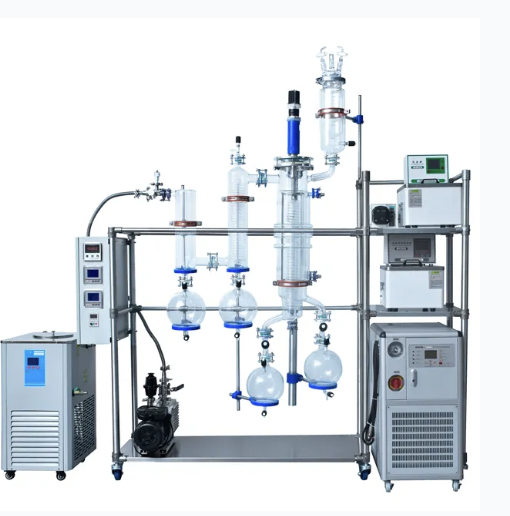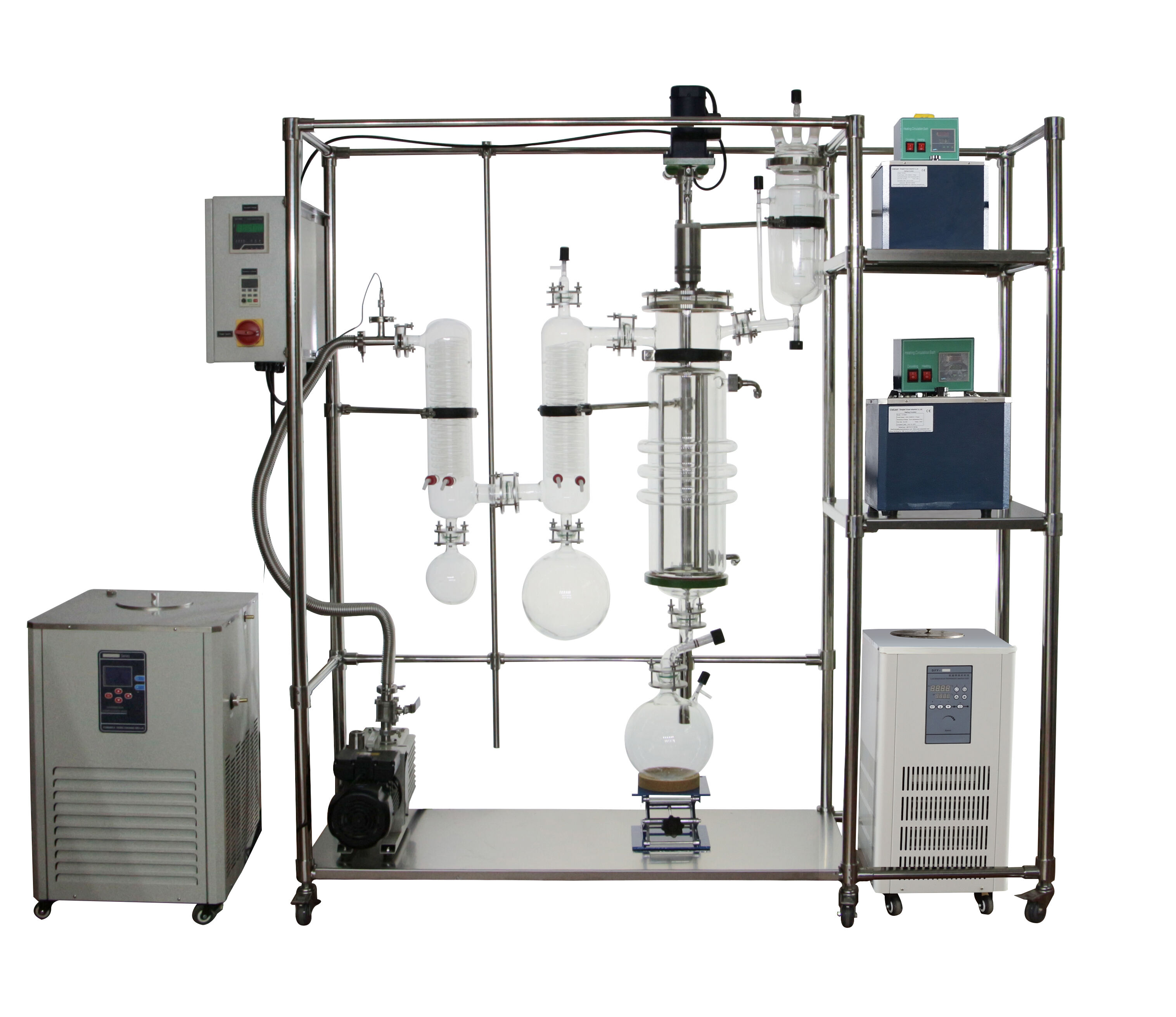Removing Impurities While Protecting Active Compounds
Gentle Separation Under Vacuum
Vacuum distillation plays a key role when we need to limit how much heat materials are exposed to, which becomes really important when working with stuff that easily evaporates or breaks down. The whole process works by creating these low pressure conditions that actually bring down what temperature things boil at. This helps keep those delicate ingredients intact instead of getting damaged by excessive heat. One particular type called Wiped Film Molecular Distillation has gained popularity because it saves energy while still moving through batches quickly. What makes this method work so well is that it spreads out the material into a super thin layer across a warm surface using those spinning wiper blades everyone talks about. This setup gives operators much better control over exactly what's happening during the distillation process. For manufacturers dealing with bigger production runs, this approach means they can handle more volume without sacrificing product quality. Most importantly, it keeps those valuable active components in the final product just as strong and effective as intended.
Wiped film distillation has proven itself time and again across various industries when it comes to enhancing both product quality and output levels. Take cannabis extraction as one real world example where this method shines. The process effectively pulls apart compounds such as THC and CBD from plant material without damaging those delicate terpenes responsible for giving products their distinctive smell and flavor characteristics. What makes this technology stand out is how well it balances speed with precision. Manufacturers can scale up production significantly while still maintaining strict quality controls required by regulatory bodies in many markets today.
Targeted Removal of Contaminants
Targeted separation works in distillation systems to get rid of specific contaminants while keeping the good stuff intact. When we talk about wiped film molecular distillation, it's all about controlling temperature and pressure really carefully. This process pulls out those unwanted bits without messing with the strength or quality of what we actually want from the mixture. The technique matters a lot in certain sectors where purity just can't be compromised. Think pharmaceutical companies making medicines or nutraceutical producers working on dietary supplements. For them, even tiny impurities could mean big problems down the line, so they rely heavily on methods that deliver clean results every time.
The numbers tell us something important about how well this works for improving product purity. Distillation systems can knock out contaminants at really high rates, making products safer and more effective overall. Industry experts talk about things like temperature control and how thick the film gets during processing as key factors in getting rid of those unwanted bits. When manufacturers tweak these variables just right, they maintain a strong but careful separation process. This means keeping all the good stuff intact while flushing away the bad stuff without damaging anything valuable in the mix.
Preserving Molecular Integrity Through Reduced Thermal Exposure
Avoiding Thermal Degradation
Temperature control matters a lot when working with sensitive chemical compounds because too much heat tends to break down their molecular structure. Keeping things cool helps avoid this problem and keeps those molecules stable. Research from pharmaceutical labs shows that preventing heat damage actually makes products work better. Take drug manufacturing for example, if companies keep temperatures low during production steps, they stop important ingredients from breaking apart, so the medicine works how it should when patients take it. Industries across sectors have started adopting these temperature management techniques not just for quality control but also because customers expect reliable results. When people know their medications or supplements won't lose potency due to poor handling, they stick with brands that deliver consistent performance.
Critical for Sensitive Substances
Some materials are just too delicate for heat, so controlling temperatures carefully during distillation becomes absolutely necessary. Think about things like cannabinoids, essential oils, those tricky vitamins they talk about so much these days all need protection from excessive heat to keep what makes them special intact. Most people who work with these stuff know that getting the temperature right matters a lot for keeping everything whole. They tend to use methods like slow heating processes and sometimes even vacuum setups to get around the problem. The industry has rules about how hot is too hot for different materials, and sticking to those guidelines really does make a difference when it comes to producing safe, high quality end products. For anyone dealing with sensitive compounds, temperature control isn't just important it's basically non negotiable if they want good results.
Achieving High-Purity, Concentrated Products
Precise Fractionation Control
Fractionation sits at the heart of distillation processes when companies need those super pure end products. The basic idea separates different compounds because they boil at different temperatures, so each part gets collected exactly where it should go. Wiped film molecular distillation takes this further by using techniques like spreading materials into thin films and speeding up vaporization for better control during separation. Take the rotating wiper blades for example they spread everything out evenly across the surface, making sure the material forms a consistent layer that works much better than random pooling would. We've seen time and again that getting this fractionation right makes all the difference in purity levels, which directly affects things like how strong or stable the final product turns out to be. Pharmaceutical manufacturers and cannabis processors rely heavily on these methods since their customers demand nothing less than perfection, and even small variations in fractionation can mean the difference between passing quality checks and having to start over.
Consistency in Final Composition
Keeping the chemical makeup consistent throughout different product batches matters a lot when it comes to reliable results. Wiped film molecular distillation plays a big role here because it creates a steady work environment where temperature and pressure can be tightly controlled during production. Manufacturers also rely on things like instant monitoring tools and responsive feedback mechanisms to keep everything uniform so no batch falls short of what was promised. Regulatory bodies including the FDA have established pretty tough guidelines for quality control, which makes sense since consumers need to trust their products actually work as intended. When companies follow these rules closely, they end up delivering goods that consistently hit those marks customers expect from day one to day fifty.
Impact on End-Product Potency
How strong an end product turns out really depends on how pure its ingredients are, and that purity comes down to what kind of distillation gets applied during processing. Techniques such as wiped film molecular distillation make a big difference when it comes to boosting product strength. Looking at test results shows there's quite a gap between items processed through these advanced methods versus standard ones, with the better distilled products always coming out stronger. Industry professionals know that tweaking things like heat levels and how fast material moves through the system can actually increase potency substantially, resulting in something that works better for consumers. For businesses in sectors where effectiveness matters most to customers, getting this distillation right isn't just important—it's absolutely critical.

Enhancing Shelf Life and Product Effectiveness
Key Parameters for Enhanced Shelf Life and Effectiveness
A product's shelf life and how well it works depend on a bunch of important things like oxidation, moisture getting in, and keeping temperatures stable. Wiped film molecular distillation stands out because it handles all these issues pretty well. The process basically takes away those pesky volatile compounds that start breaking down the product over time, which means longer lasting results for manufacturers. Some testing done in labs shows that when companies switch to better distillation techniques, they see much slower oxidation happening in their products. This translates to stuff staying stable for longer periods, which everyone from chemists to warehouse managers appreciates.
Long-Term Stability Improvements
Wiped film molecular distillation stands out among advanced distillation techniques when it comes to making products last longer on shelves. The way this method works actually cleans things up better than traditional approaches, cutting down on unwanted substances that might eventually break down the product quality. Food manufacturers have seen real results from using this technique, with some reporting their oils stay fresh for months longer after processing. Companies following strict testing guidelines from organizations like ICH find that their products pass stability tests much more reliably when they incorporate these modern distillation practices into their production lines.
Applications Utilizing Enhanced Product Quality
Pharmaceutical and Nutraceutical Purity
The pharma and nutraceutical sectors have always had crazy high standards when it comes to purity because people's health is literally on the line. Regulations from bodies like the FDA basically force companies to hit these impossible targets for clean products. Enter wiped film molecular distillation – this technique actually works wonders at getting rid of contaminants without messing up delicate ingredients. We've seen it in action making super pure pharmaceutical oils and all sorts of dietary supplements where even tiny impurities can ruin everything. The market keeps expanding too, so manufacturers are increasingly turning to these sophisticated distillation methods just to stay compliant and deliver what customers expect from their medications and health products.
Food-Grade Concentration and Purification
Getting food to meet grade purity standards matters a lot when it comes to keeping consumers safe and maintaining product quality in the food industry. Wiped film molecular distillation stands out as a key method here because it offers an exacting distillation process that hits those tough standards. Food manufacturers use this technique all the time for things like creating flavors, extracting essential oils, and making various food additives where impurities can really affect how good something tastes or works. We're seeing more people want to know exactly what's in their food these days. The market shows clear signs of rising interest in products with clean labels and transparent ingredient lists. People just want healthier options without all the mystery stuff. Companies that invest in proper food grade purification methods are finding themselves ahead of the game in this evolving marketplace.
Cannabis Extract Refinement
Purity and strength matter a lot when it comes to cannabis extracts these days, especially since people are using them for everything from medical treatments to weekend relaxation. Wiped film molecular distillation stands out as one of the best ways to refine cannabis oils because it separates those tricky volatile components while keeping the good stuff intact. As more areas around the world have legalized cannabis, we've seen markets grow rapidly, which means manufacturers need to produce products that actually meet all those complicated regulations and safety requirements. What makes this particular distillation technique so useful? It creates really clean, powerful extracts that consumers care deeply about now. People want their cannabis products safe and effective, not just some random batch from an unknown source.
FAQ
What is wiped film molecular distillation?
Wiped film molecular distillation is a method of vacuum distillation where a thin film of material is spread over a heated surface with rotating wiper blades, allowing for efficient separation of substances with minimal thermal exposure.
How does wiped film molecular distillation benefit the cannabis industry?
In the cannabis industry, wiped film molecular distillation separates cannabinoids like THC and CBD, while preserving terpenes, enhancing product quality and supporting scalable operations.
Why is temperature control crucial in wiped film distillation?
Temperature control is vital to prevent thermal degradation of sensitive substances like cannabinoids and essential oils, helping maintain their integrity and effectiveness.
What industries benefit from wiped film molecular distillation?
Industries such as pharmaceuticals, nutraceuticals, food, and cannabis benefit from wiped film molecular distillation due to its ability to enhance product purity, potency, and stability.
Table of Contents
- Removing Impurities While Protecting Active Compounds
- Gentle Separation Under Vacuum
- Targeted Removal of Contaminants
- Preserving Molecular Integrity Through Reduced Thermal Exposure
- Achieving High-Purity, Concentrated Products
- Enhancing Shelf Life and Product Effectiveness
- Applications Utilizing Enhanced Product Quality
- FAQ

